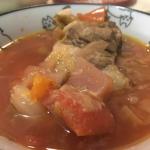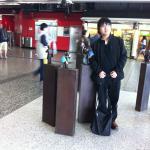
I told her it was an honour to be mistaken for a Hongkonger. Ever since I had been invested in my research, which has been haunted by the city of Hong Kong from the beginning, I had always been concerned about being an interloper. In fact, I had since my teens tried to distinguish myself from being what my Vancouver friends used to affectionately call a ‘honger,’ someone who may have moved from Hong Kong to North America but made no attempt to assimilate in a cultural sense. Growing up in the San Francisco Bay Area, our church fellowship, of course, made no such distinctions because we were small. As it was, I made an attempt to differentiate from them but was probably not very good at it. It paid off, I think, in the end. In fact, the people in that group that I still claim as my friends are the Hong Kong people, the very folks I was not supposed to associate with.
Indeed, I count it a success that by the end of my 2012 period of doctoral field work in that city, I was mistaken for a Hongkonger. Not only did I have the opportunity to share my research on the radio – where I was mistaken for being Singaporean – but I had also been told by an engineering professor at Hong Kong University in front of a bunch of students at a church I was observing that my research was no good. They were taken aback, but at that point, I was used to it. I was young, around 24 years old, and older academics in Asia often liked to say mean things about my work because they didn’t like my young upstart attitude. Having learned that however humble I actually was didn’t actually matter because whatever punk kid attitude I had was in fact only going on in their own heads, I decided that whenever this kind of thing happened, I’d have some fun with it.
But this experience was glorious. The professor accused me of choosing a topic, Cantonese Protestants, because I wanted to research my own people. If I had had real research fortitude, he said, I’d have elected to research Buddhists in China. I gave my myriad of reasons for studying Cantonese Protestants, that they were interesting for a number of theoretical issues in geography, but he could not be persuaded. He said in retort: We Hongkongers cannot be so narrowminded. It’s not like you are one of those ABCs, a reference to ‘American-born Chinese’ that folks in Asia often take to be obsessed with their own identities and therefore produce research that they disrespect because they can’t read Chinese and, being jook sing ’hollow bamboos,’ have nothing but emptiness to contribute. I took a sip of tea before delivering the coup de grâce: But I am an ABC, I said. I got a round of applause from the Hong Kong students. I was bad at being an ABC, and I wasn’t even a ‘honger’ in the North American sense. They saw me as a Hong Kong person.
Of course, I am not from Hong Kong. I feel, though, that the city has overshadowed my work. The truer truth, of course, is that I have always been wrapped up in its trans-Pacific social field in the space of my home since I was a child. Hong Kong was where my mother and father fell in love in the 1970s, right when the phenomenon of the ‘Hong Kong person’ was coming into vogue. The sociologist Hugh Baker describes ‘Hong Kong man’ almost in uniate terms, a Cantonese James Bond, fancying himself sophisticated because of his affected British manners while it is obvious that his mentality is colonized. After years of resentment at having been so intimately formed by this culture of imitation, I suppose I am finally owning it.
In my most recent piece in Patriyarkhat, I even posit that I had to become what the Orthodox mistakenly call a ‘Uniate’ in order to understand the uniatism of my past, if not the uniate impulse that is laced through secular modernity. While I was writing that piece, more than one very thoughtful person in our Greek Catholic church asked me whether organic developments in our tradition from the bottom up, often influenced by our colonization by the Austro-Hungarians or the Poles or the Muscovites or even by Rome, counted as uniatism. I had to think about this. Probably not, I am starting to think. At least as Eastern Catholic theologians like Korolevsky and Zoghby understand it, uniatism requires an inferiority complex. Stealing good ideas, or even just funny ones, and making them your own is just what Michel de Certeau SJ calls the practice of everyday life. In this sense, there is something to be said about the common love that most Ukrainians and Hong Kong people share for 007, though neither are technically British. There is something comic about appropriation, especially from empire. In fact, it may even be responsible for our sense of humor. Actually, the truth is that I understood this principle all along, way before I became Eastern Catholic: this is the subject of my undergraduate honours thesis in history at the University of British Columbia. Both Plato and the psychoanalysts say that you know things before you know them. I agree with them. I also realized this while I was at my brother Julian Hayda’s apartment on yet another writing session. He put on Kvitka Cisyk’s Songs of Ukraine. I sat up. What is this? I asked. It sounded just like Hong Kong Cantopop music from the late seventies to early eighties, just in Ukrainian.
The hardest part to accept, I think, is the appropriation. It’s not particular to Hong Kong people; frankly, anyone who has a family background anywhere in Asia that has been colonized by modern empire, which is everywhere, will know what I am talking about. But I am not Korean or Taiwanese or Filipino or Vietnamese. My family is from Hong Kong; we moved there from throughout the villages and cities of Guangdong Province, except my grandfather, who grew up on the outskirts of Shanghai. It is trite to say that in ‘Asian cultures,’ there is a sense of familial love, of respect at the level of the heart, and a way of communicating affection through food. I am not sure anymore if that’s ‘Asian’ because I’ve encountered it from so many people throughout the world, even folks who claim to be white, that I am pretty sure that it’s just about being a decent human being. However, the way that I do know how to love, which was instilled in me as a child by way of imitating women and men of an older generation than me, is to appropriate what powerful institutions offer to citizens and consumers and then, after transforming them through the medium of love, offer it to beloved ones close to oneself. I hear from my bishop that this way of doing things is not restricted to Asia. Growing up on the Canadian prairies, he used to think that Chinese and Ukrainian food were the same thing because the local Chinese restaurants served varenyky as dumplings, as well as other mix-and-match goodies. The result was fortuitous: it made him think that Chinese people were Ukrainians. I count my blessings for this happy mix-up; without his omophor, our prayers for the Umbrella Movement in Hong Kong would not be possible. In fact, he went to Hong Kong, toured the sites of the occupations, and brought back for our temple the crucifix used at St Francis’ Chapel on the Street in the Mong Kok occupation. In such moments, I am grateful for his childhood, the stuff that has supplied the imagination for understanding our Kyivan Church as truly Catholic and not an ethnic chaplaincy.
This kind of thing drives purists, including me at one point, up a wall. Don’t you understand the history of these things you’re appropriating? I would ask. Don’t you care that the source is problematic? Why do you always have to imitate other people? These questions, though, never seem to enter the minds of those who show love in this way. The question for them is whether it tastes good, looks good, smells good, sounds good, feels good, seems good. Here, the real uniatism is revealed — and it is on the side of the purists who have an inferiority complex with relation to some standard of cultural sophistication and historical knowledge. As I said in my Patriyarkhat piece, it was like I wanted to purge myself of these Hong Kong — and frankly, also Taiwanese and Chinese — sensibilities and just become American and a good standard-issue evangelical Christian.
There is a song that I feel almost perfectly illustrates my hesitancy about admitting that I love like a Hong Kong person. In 2007, the singer Stephanie Cheng catapulted to super-stardom while singing a ballad she wrote titled ‘Traffic Light 紅錄燈.’ It’s a song that uses the metaphor of a traffic light to talk about an unrequited love. Since I was small teachers were very earnest, she said, to teach me about crossing at a traffic light. Right and left must be truly seen, the one time done wrong can wreck your life. The problem, she says, is that in real life — such as in romantic love — it’s clearly a green light, but once you turn your eyes, it has changed to red. The music video is even more pronounced. Cheng works at a laundry and has a crush on a guy who drops off his clothes, even finding a love letter in one of the packages. And then he comes back. Oops, they discover, he had left that in there and meant to give it to someone else. Bummer.
I became obsessed with this video in the late summer of 2008, shortly after flaming out of discernment about ordination in the Anglican Communion right before the global financial meltdown. On hindsight, the burnout was liberating. What had basically happened was that the youth group that I started imploded, and suddenly, I did not need to play the politics of being an English-speaking second-generation guy. The church I served, of course, did not require me to choose this identity; it was rather that in starting this youth group and an English-ministry, it was I who excised parts of my upbringing in a Hong Kong trans-Pacific social field in order to justify the existence of such ministries in the Chinese church. All of a sudden, I was free, and what was more, I became very interested in my graduate work in geography in Hong Kong as a transnational city, doubling down on the undergraduate thesis that I had written on ‘Hong Kong man.’ In that process, I discovered this song, listening to it in secret so that my family wouldn’t hear that I was getting into Hong Kong popular culture. Of course, my Cantonese was rusty from years of disuse, and as a result, I focused a lot more on the ways that Cheng appropriates parts of ‘western culture’ in her portrayal of Hong Kong everyday life, like the Canada Dry t-shirt she wears at the beginning. It’s so natural, the way she behaves, which is contrast to the overthinking about which she sings.
Here, I think, is the problem of loving as a Hong Kong person. The offerings of appropriation come organically, naturally, as a simple matter of everyday life. But parallel to that is the overthinking, the purism, the colonial ‘banking model’ of education that Cheng sings about her teachers instilling in her so that she is confused when faced with the real-world problem of clearly green light, turn eye become red light. Probably solely because of the way that I encountered the song, I identify with the way that Cheng presents the struggle of love. We are not so different, her and I. It turns out that one of the most Hong Kong things you can do is to attempt to delete one’s sense of being in the shadow of Hong Kong as a city, grounded in a Cantonese sensibility of humorous appropriation and familial offering to one’s sisters and brothers. It is just that in North America, I could make a more persuasive case for the denial of my secret ‘honger’ status, stashing away the music of the Carpenters and ABBA and the Temptations and the Platters (all of whose influences have never left Canto-pop) for listening on headphones, complaining about being trapped in an ethnic ghetto to my mom while chowing down on baked Portuguese chicken rice (a Hong Kong reworking of something that people in Macao imitated from their colonizers), and refusing to speak Cantonese when it is one of the languages of my heart (the other being Taiwanese Mandarin). The irony here is that the uniatism does not lie in the sense of appropriation. It’s in the purist perversion.
What those in the secular world know as New Year’s Eve is for us in the Kyivan Church the Eve of the Feasts of the Circumcision of the Lord and of the Holy Hierarch Basil the Great. Christ is circumcised! some of us joke that the greeting is – Put a bandaid on him! Numerous scholars have attempted to explain the meaning of circumcision going back far into Hebrew tradition, but it is itself a mystery, like sand that slips through one’s fingers when trying to grasp it. But what the mark on the most intimate parts is perhaps explained with this association with Basil, the hierarch from whose first canon we get a sense of how radical the concept of economia is. While believing that heretics should probably be re-baptized, Basil says in his first canon that ‘for the sake of oikonomia,’ he will not make a fuss. As Sister Vassa Larin explains, what Basil is talking about is the ‘house-building of God,’ that the canons are meant to be measuring rods used as tools to build up God’s house. There is support, in other words, for an organic building of a way of life, even one that operates by joyful appropriation from the stuff of everyday life, by which love is communicated in a material way. Revealing that I am a secret honger on this New Year’s Eve is therefore not a doubling-down on ethnicity. It is that in being true to who I am, how I grew up, and the world from which I have gathered materials for building my own house, I enter into the universality – indeed, the catholicity – of the shared personhood by which a koinonia of love is formed, and in this way, the uniatism that is symptomized by purist overthinking can slowly be overcome by being rooted in the actual stuff of my everyday life.












